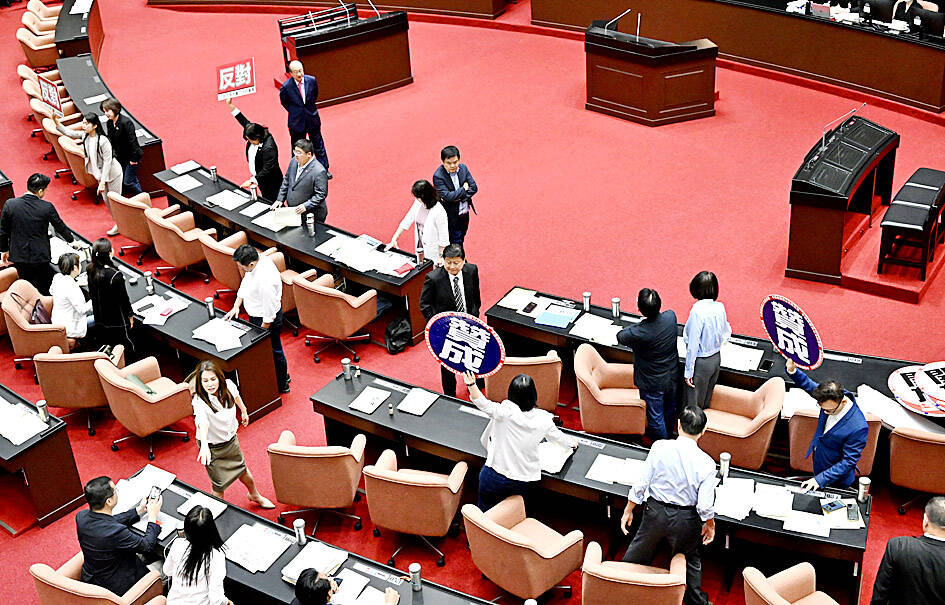The Democratic Progressive Party (DPP), the Chinese Nationalist Party (KMT) and the Taiwan People’s Party (TPP) caucuses have each proposed motions on UN Resolution 2758 in the new legislative session that began yesterday.
The DPP caucus proposed a motion stating that “UN Resolution 2758 does not involve Taiwan” and that Beijing mischaracterized it to block Taiwan’s international participation.
The resolution mentions only China’s representation in the UN; it does not say it considers Taiwan to be part of China, nor does it authorize the People’s Republic of China (PRC) to represent Taiwan in the UN, the DPP said, adding that it is an undeniable fact that the resolution does not endorse the “one China” principle.

Photo: Lo Pei-de, Taipei Times
The Republic of China (ROC) is an independent country with sovereignty and is not subordinate to the PRC and vice versa, it said, adding that only the government elected by Taiwanese can represent Taiwan in the UN and other international entities.
Taiwan “firmly opposes China’s distortion of UN Resolution 2758, deterring Taiwan from taking part in international organizations such as the UN, and depriving the right of 23 million Taiwanese to join the international community,” the DPP caucus said. “China should immediately refrain from linking UN Resolution 2758 to its so-called ‘one China’ principle, as it would jeopardize cross-strait peace and stability, Indo-Pacific regional security and prosperity, and the rule-based international order.”
“The UN should apply the principle of universality as specified in the UN Charter and fulfill its promise to ‘leave no one behind’ by embracing Taiwan’s full participation as soon as possible,” it added.
The KMT caucus proposed a motion that said the ROC is a sovereign, independent country and a founding member state of the UN.
The resolution unjustly excludes the ROC from the UN and international participation, resulting in a long-standing lack of rights protection for Taiwanese internationally and the marginalization of the nation, it said.
“While the ROC and its people have the right to join the UN and other international organizations, the deterrence of their participation in these international entities is not only unfair and unjust to the nation and its people, but also a loss to the world,” the KMT said.
“Beijing should face the objective reality that the ROC exists and that the ROC Constitution stipulates the nation’s inseparable de jure sovereignty,” it said. “Both sides should promote cross-strait exchanges in accordance with the Act Governing Relations Between the People of the Taiwan Area and the Mainland Area (兩岸人民關係條例) to maintain cross-strait stability and world peace.”
“The UN General Assembly should apply the principle of universality as specified in the UN Charter by embracing the ROC’s return and full participation as soon as possible,” the KMT caucus said.
The TPP caucus’ proposed motion said that historical and political entanglements between the ROC and the other side of the Taiwan Strait are persistent.
Taiwan’s international status has attracted global attention in recent years, it said, adding that based on the UN Charter, it should have been allowed broader international participation and its people should have enjoyed the right to participate internationally as people of other nations do, it said.
The government should “fight for meaningful participation in international organizations to broaden Taiwan’s international participation,” the TPP said.

Taiwanese can file complaints with the Tourism Administration to report travel agencies if their activities caused termination of a person’s citizenship, Mainland Affairs Council Minister Chiu Chui-cheng (邱垂正) said yesterday, after a podcaster highlighted a case in which a person’s citizenship was canceled for receiving a single-use Chinese passport to enter Russia. The council is aware of incidents in which people who signed up through Chinese travel agencies for tours of Russia were told they could obtain Russian visas and fast-track border clearance, Chiu told reporters on the sidelines of an event in Taipei. However, the travel agencies actually applied

Japanese footwear brand Onitsuka Tiger today issued a public apology and said it has suspended an employee amid allegations that the staff member discriminated against a Vietnamese customer at its Taipei 101 store. Posting on the social media platform Threads yesterday, a user said that an employee at the store said that “those shoes are very expensive” when her friend, who is a migrant worker from Vietnam, asked for assistance. The employee then ignored her until she asked again, to which she replied: "We don't have a size 37." The post had amassed nearly 26,000 likes and 916 comments as of this

New measures aimed at making Taiwan more attractive to foreign professionals came into effect this month, the National Development Council said yesterday. Among the changes, international students at Taiwanese universities would be able to work in Taiwan without a work permit in the two years after they graduate, explainer materials provided by the council said. In addition, foreign nationals who graduated from one of the world’s top 200 universities within the past five years can also apply for a two-year open work permit. Previously, those graduates would have needed to apply for a work permit using point-based criteria or have a Taiwanese company

The Shilin District Prosecutors’ Office yesterday indicted two Taiwanese and issued a wanted notice for Pete Liu (劉作虎), founder of Shenzhen-based smartphone manufacturer OnePlus Technology Co (萬普拉斯科技), for allegedly contravening the Act Governing Relations Between the People of the Taiwan Area and the Mainland Area (臺灣地區與大陸地區人民關係條例) by poaching 70 engineers in Taiwan. Liu allegedly traveled to Taiwan at the end of 2014 and met with a Taiwanese man surnamed Lin (林) to discuss establishing a mobile software research and development (R&D) team in Taiwan, prosecutors said. Without approval from the government, Lin, following Liu’s instructions, recruited more than 70 software